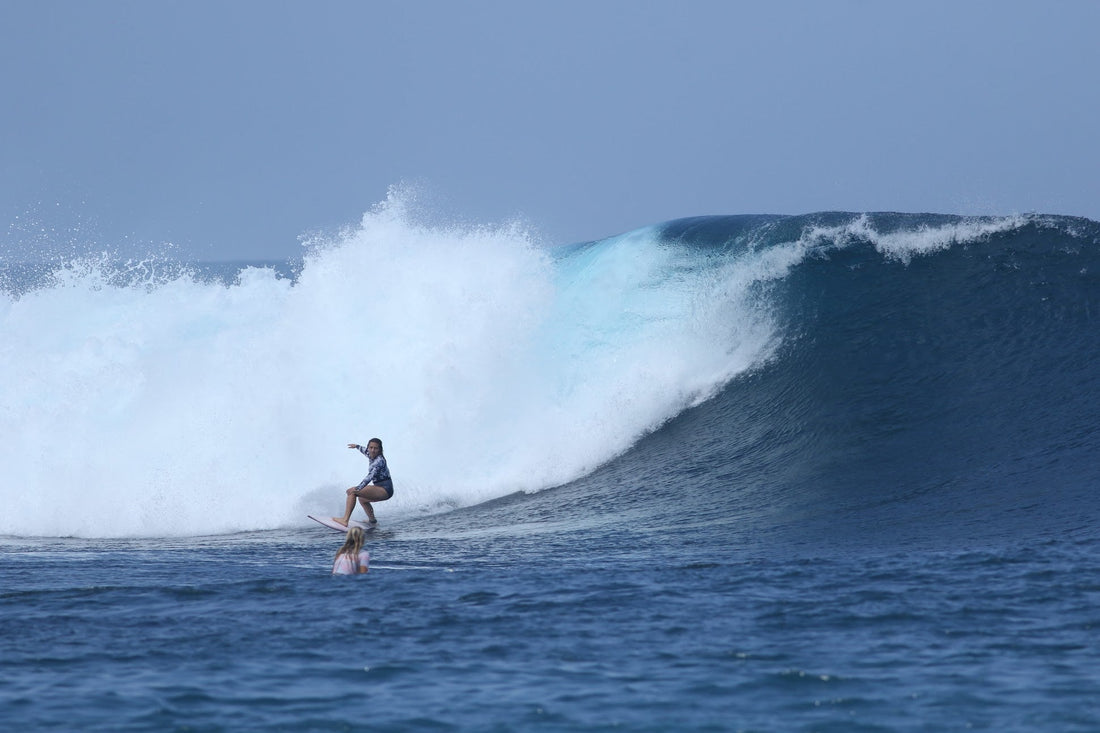
Share
Surf Smarter: 6 Coach-Approved Tips to Improve Your Skills
Share
So, you've moved past the beginner stage, but now you're feeling stuck. Maybe you're catching waves but struggling to generate speed, or you’re unsure how to read the lineup like the pros. The intermediate phase is where many surfers hit a plateau—but with the right guidance, you can keep progressing.
To help you level up, We asked surf coach Tiff Riggs for her best advice on improving your skills, wave selection, and overall confidence in the water. Whether you’re looking to turn more efficiently, paddle with more power, or just feel more in control, these six tips will help you take your surfing to the next level.
6 techniques to help with progressing your surfing at the intermediate stage
So, you’ve got the basics down—you can paddle out, pop up, and ride a wave without too much chaos. But now, you’re at that tricky in-between stage: not a beginner, but not quite nailing those smooth, confident turns either.
This is where the real fun begins! The difference between just riding waves and truly surfing comes down to refining your technique, building confidence, and making small but powerful adjustments. These six tips will help you paddle smarter, move with more control, and finally feel like you're flowing with the wave—not fighting against it.
1. Paddle Smart, Not Hard
Paddling is a huge part of surfing, we spend most of our time doing it more so then surfing, it can be tough and one of the biggest challenges. But if you do it right, you’ll get the momentum into waves with less effort and more grace. Keep your chest up, engage your core, and take long, deep strokes. Engage your back and try pinch your shoulder blades together to use all your muscles for power not relying solely on your arms only, Think powerful and efficient strokes.
2. Learn to Read the Ocean
Ever notice how some surfers always seem to be in the right place? That’s not luck—that’s knowing how to read waves. Before paddling out, take some time to watch where the waves are breaking, where people are catching the best waves, is there more than one take off position or peak? This will allow you to move around if it gets busy or the wave is not suitable for your level, The more you pay attention, the less you’ll waste energy chasing waves that go nowhere.
3. Turn Like You Mean It
If you think you’re turning hard, you’re probably not turning hard enough. If you feel like you’re crouching low, you’re probably still standing too tall. Whatever you’re doing, add more to it—bigger bends, deeper turns, stronger weight shifts. It’ll feel weird at first, but trust me, it works. If you’re going to turn, commit. A half-hearted turn does nothing but make you feel frustrated. Lead with your eyes and shoulders, bend those knees, and don’t be afraid to put some power into it. If you fall don’t stress that’s how you learn!
4. Visualise Success Before You Even Paddle Out
If you can see it in your head, you can do it in the water. Visualisation is a powerful tool that helps bridge the gap between understanding a technique and executing it in the water. By mentally rehearsing movements, you build muscle memory and confidence. Before paddling out, take a moment to picture yourself catching that perfect wave, popping up smoothly, and performing the manoeuvre you desire. Even after catching a great wave replay it in your mind and this will reinforce good habits and build confidence. Athletes do this all the time, and guess what? It works.
5. Watch Yourself on Video—It’s Eye-Opening
What you think you’re doing and what you’re actually doing are often two different things. Watching yourself on video (yes, even if it’s painful) will show you exactly where you need to improve. It doesn’t seem as bad if you play your favourite tune with it! Honestly though, having someone film you will make it easier for you to see clearly your mistakes and have someone like a coach or better surfer give you objective feedback so you can correct technique faster. You can play it slowly and freeze frames, compare it to footage of a pro surfer if you want. Keep the footage to track progress!
6. Own Your Spot in the Lineup - Confidence is key.
If you paddle into a wave like you don’t believe you deserve it, you won’t catch it—or worse, you’ll hesitate and mess up your timing. Trust yourself. You’ve put in the work, and you belong out there just as much as anyone else. So sit tall, commit, and own it.
Progressing as an intermediate surfer takes patience, practice, and a willingness to refine the fundamentals. By focusing on better wave selection, improving your technique, and building ocean awareness, you’ll start to feel more confident and in control every session.
Remember, even the best surfers are always learning—so stay curious, keep challenging yourself, and most importantly, have fun out there. The more time you spend in the water applying these tips, the faster you’ll see progress. Now go grab your board and put these insights into action!
Tiff is a level 2 Advanced Surf Coach , you can find her on instagram at @tiffany.riggs.nextwave and stay updated with her surf retreats and trips.
